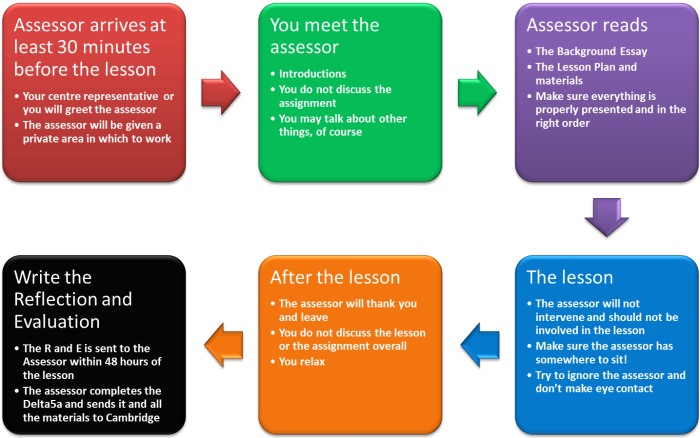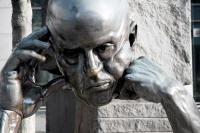The external assessment for Delta Module Two: frequently asked questions

 |
How important is the externally assessed assignment? |
Very.
Although it's not a completely hard-and-fast rule, you have to pass
both parts of the external assignment to pass Module Two overall.
To get a Merit or Distinction, you have to get a Merit or
Distinction in the externally assessed lesson and at least a pass the
Background Essay.
 |
Who are the assessors? |
They are ELT training professionals.
- Most are or have recently been Delta tutors
- All of them have also been externally assessed in the same way (so they know how it feels)
- They are drawn from a wide variety of backgrounds and have worked in a range of teaching settings
- They have all been through an annual standardisation process run by Cambridge Assessment English
- They are all English Language Teachers
- They are all humans
 |
What are assessors looking for? |
External Assessors are looking for exactly the same things as
centre tutors look for in all other LSAs. They use the same
forms and are standardised in the same way. There are no
secrets.
There are guides on this site to meeting the criteria for the
Background Essay, the
Lesson Plan,
Teaching and the Reflection and
Evaluation. Make sure you remind yourself of the important
data in those.
For an example of the Delta5a form,
click here.
 |
What paperwork do assessors need? |
Make sure you have available, preferably in two or three separate folders:
- Your Background Essay
This should have:- Been word-processed with a standard font and font size, proofread and checked (twice)
- Page numbers
- A cover sheet setting out who wrote it, the centre number, your candidate number, the word count and its title
- A footer containing the title, your name and your centre
/ candidate number like this:
Helping low level learners to express past experiences, J Bloggs, XX000/004
- Your complete, properly ordered lesson plan
This should contain- A cover sheet and footer as above
- All the materials the students will get or you will use in the lesson in the order you will use them
After the lesson, you send your Reflection and Evaluation including a cover sheet and footer as above, via your centre. The assessor should get this within 48 hours of the end of the lesson.
 |
Do I also send paperwork electronically to the assessor? |
Yes, but via your centre. All the paperwork for
your assignment must be available in electronic format.
This is how it is transferred to Cambridge except in unusual
circumstances.
If the assessor has explicitly told the centre or you that it is in order, he or she may not require hard copy of everything on the day but it is as well to have it available.
 |
What happens on the day? |
Here's the procedure:

 |
Can an assessed lesson be online or remotely assessed? |
Yes.
Temporarily, it is alleged, because of the Covid-19 pandemic, Cambridge have altered the rules so that you can now undertake the external and internal assessments of your teaching in three ways:
- Traditionally, with the observer sitting in on a live lesson with all learners present. Previously, this was the only way assessments of teaching were done.
- With you and the learners in the same room but the assessor watching a live stream of the lesson. Note that the lesson must be viewed live. You cannot submit a recording.
- With you teaching fully online with no face-to-face contact
with the learners. The assessor will simply be a
participant (although silent) but will need access to break-out
rooms and so on.
There are strict limitations concerning the platform that is used for this kind of lesson and the regulations for its conduct.
Talk to your centre.
Note that these are temporary arrangements at the moment but serious consideration is being given to making them permanent (as is already the case for CELTA, incidentally).
 |
Where should the assessor sit? |
Classrooms vary but if possible:
- Place a chair and a table (or seminar chair) at the back of the room
- Make sure the assessor can see the whole class
- Make sure the assessor has a clear view of any aids (boards, projector screens, flipcharts etc.)
- Keep the assessor behind or to the side of the learners so eye contact is minimised
- Put the assessor's place near an electrical supply for a laptop if needed
- Make it somewhere comfortable (out of strong sunlight, away from fierce heat etc.)
 |
What do the assessors do in the lesson? |
They watch, listen and assess. Assessors may:
- Move around if they need to see what learners are doing / writing
- Seem to be doing nothing – they are thinking
- Read – they are probably checking your plan and seeing where the timing is and what the aim of a stage is
- Type on a laptop. Some assessors hand-write notes, some type a list of thoughts, some type directly into a Delta5a form and edit it later.
Assessors do not:
- Get involved in the lesson
- Interrupt you
- Talk to the learners if they can avoid it
- Make eye contact with the learners or you
- Grimace, groan or grin (usually)
 |
What happens if ... |
Here are a few of the usual questions following the What happens if ...:
- I need to change the date or time of the assessment?
- This shouldn't happen and can be a real problem if the assessor is travelling a long way to see you. If it is unavoidable, you must go through the centre to make a new arrangement and you must do this as soon as you can. If you know another candidate who is being assessed in the same session and swapping times would solve the problem, suggest this to the centre but do not just do it!
- I don't have enough learners in the group?
- The minimum number is five (there is no maximum). If
this number is not present at the beginning, the assessor can
wait 15 minutes for more to arrive (or be found from other
groups).
There may be exceptional circumstances, such as industrial action, cancelled public transport, terror alerts, unusually severe weather and so on, and the assessor has the discretion to go ahead with the assessment in any case. Note that a learner being ill or unable to attend because of work commitments etc. does not count as an exceptional circumstance. - I need to cancel the assessment and rearrange it for another time / session?
- This will incur a cost and you will be liable for it.
- my lesson overruns?
- The assessor may be able to stay up to 15 minutes beyond the scheduled end time but not if there is another assessment to follow on, of course. Making sure it doesn't happen is a better way forward.
- my lesson for the assessment forms part of a longer session so I want to do the introductory, scene-setting work and the follow-up free practice before the assessor arrives and after she leaves?
- Do not do this. The assessor has to see a complete and self-contained teaching unit. It is sometimes an unnatural constraint but that's how it is.
- I want the assessor to tell me if it was all OK?
- Don't ask. Assessors may not discuss the lesson with you at all.
- I want to comment on the assessor's behaviour?
- There's a form for this which your centre can let you have. The centre tutor needs to countersign it and send it to Cambridge.
- I have noticed a silly error in my materials / the lesson plan / the background essay and want to give the assessor a revised version after the lesson?
- You can't. The assessor is required only to accept materials given in before the lesson. Don't let it happen.
- the assessor has asked that an assessor-in-training accompany him or her?
- You can, if you want to, refuse to allow this.
- I do not want the assessor to use a laptop during the lesson
- You have to notify the centre of your wishes and these will be respected.
- I want to contact the assessor?
- Don't even try. It's not allowed. All contacts with assessors are the centre's responsibility.
- I have a potentially disruptive student in the group and I want to explain the problem to the assessor?
- This should be in your lesson plan both under the profiles of the learners and the group and in your anticipated problems and solutions section.
- I was not feeling well on the day of the assessment and think this may have affected my performance?
- The centre (not you) can send a notification of Special Circumstances to Cambridge and it will be considered. The assessor will not take this into account. You will need some medical evidence, ideally.
 |
What happens next? |
All the paperwork ends up in Cambridge Assessment's swanky new building in Cambridge. It
is here that it all comes together for the first time and
consideration is given to the results of the external assessment
and your internal coursework portfolio.
For more of what happens to it there, go to the guide to Delta
terminology and systems.
 |
Why are results so slow in arriving? |
It depends slightly on when you take the external assessment.
Moderation of Module Two results happens three times a year only
because it is impractical for Moderators to work together more
frequently than that.
This means that reports from external assessors are held until the
next Moderation meeting and you may be unlucky to fall just after
one so there will be a delay.
Quite a lot has to happen at Moderation and lots of effort is put in to making sure
the result is the right one and truly reflects your performance.
It's worth the wait.
| The Delta index |
